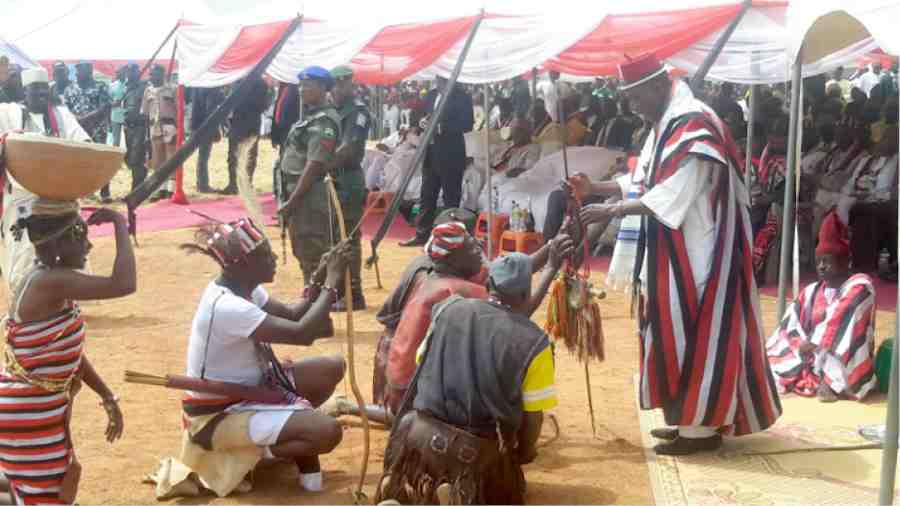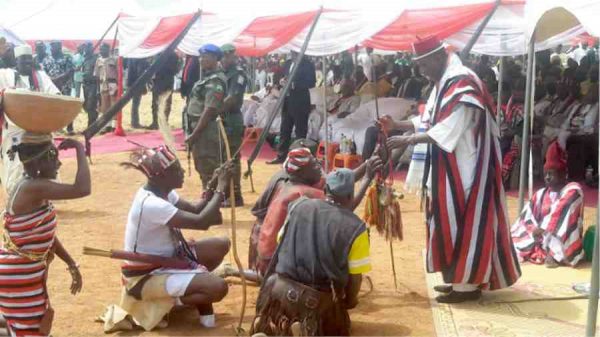The Zaar or ‘Sayawa’ as they are called by their Hausa-Fulani neighbours are found in two Local Govt Areas of Bauchi State namely; Tafawa Balewa and Bogoro. The Zaar (Sayawa) speakers are the second largest ethnic group in Bauchi State.
Read more about Ethnic groups in Nigeria
Background/ Brief History
The Sayawa are said to have migrated from the east to the present Chad Republic between the 9th and 13th centuries. It is believed that they migrated together with the Jarawa, Warjawa in Ningi Local Government Area, Famawa, Angasawa, Surawa, Mgavul and Mupun in Plateau state; Kutumbawa in Kano State, Babur/Burra, Margi and Kilba in Borno and Adamawa states.
Their language has great similarities to those of the Warjawa, Babur/Bura, Kilba, Margi and Terawa. The Sayawa language is classified with the Chadian group of languages. The two major dialects the sayawa language is broken into are; Sangh-ghshi and Sangh-gami dialects.
It is also believed that there was a strong relationship between Sayawa and Gobir (Hausa) because of the similarity of tribal marks.
The Sayawa people claim to be the earliest settlers in the Tafawa Balewa Area of Bauchi State, tracing their migration to the area back to the 13th century from the south of Tchad, and the Kanem Bornu Empire. They claim to have settled first at the foot of the black stone, which was called Puji.
They refer to the Fulani as the second settlers who co-habited the place as pastoralists. Therefore, the present Tafawa Balewa was originally called Puji, derived from Sayawa Language, “Pus” – meaning stone, “ji” meaning black. The two words put together formed “PUSJI” – meaning black stone. The Fulani settlers were to eventually literally translate Pusji to Tafawa – Balewa, a Fulani word for black stone.
Sign up to the Connect Nigeria daily newsletter
The name was to be changed by Hausa traders to “Tafawa Balewa” (Dauda, 1999). Having firmly established commercial trading commodities like salt, potash, hoes, which they sold to the Sayawa people for which they exchanged goats, rams, guinea corn, cotton, rice, the Hausa gradually increased in population.
How they came to be called “Sayawa”:
The term “Sayawa” was the name Hausa speakers adopted for the Zaar People. “Saya” in Hausa when translated into English means “buy”, so Sayawa means “buyers” in Hausa. When Zaar migrated from Chad to their present location, they were rich culturally. They were also self-sufficient economically (farming and exchanging goods and services).
Whenever the Hausa speakers needed markets for their goods, they would normally say “let’s go to ‘sayawa’’ or ‘buyers’ surely they will not fail when it comes to purchasing. Hence, the name Sayawa came into being.
To Sayawa speakers, “Zaar” is their real name down from Chad to their present location. Zaar means “Person of the land”, literally means a person self-reliant on farming.
Socio-Economic outlook:
They are known to be great farmers and warriors, hospitable and peaceful by nature.
Traditional Dances:
The Sayawa have a rich cultural heritage which is represented in their dances. In their traditions, all the seasons year-round are celebrated and for every event, their dance adapted particularly for that occasion. One of such dances is called “taka ka sha mari” which means “Step on it and beaten/slapped’’. During the dance, the dancers are careful not to step on the tail-like costumes made from animal skins and all tied around the waste of other dancers. Any dancer who steps on the tail of another dancer gets to be slapped in consequence.
Religious Beliefs:
Before the arrival of the Christian missionaries, the Sayawa were pagans/African Traditional worshippers.
Traditional Attire & Cuisines
The Zaar traditional attire is usually red, black and white. With the red signifying the blood of those who were killed fighting for their rights, the black colour signifying the dark ages of persecution and slavery while the white signifies hope for the future.
One of the staple foods among the sayawa is Kingiri soup and tuwon acha. Kingiri soup is made from groundnuts, karkashi and locust beans.
Traditional Rulership
The ‘’Gung Zaar’’ is the Zaar paramount ruler.
Traditional Festivals:
Every year, people troop into Tafawa Balewa in Bauchi State for the gathering of the Zaar or Sayawa tribe as the drums beat in celebration of bumper harvests. The festival is called the Lempn Zaar.
The Zaar people, according to history, set aside a month to harvest their crops and thank God for good yields after toiling on their farms. Not only celebrating the bumper harvest, but the Lemon Zaar is also a unique cultural celebration to re-enacting past traditions.
Sources:
Wikipedia
Global Academic Group
Featured Image Source: Daily Trust
Got a suggestion? Contact us: [email protected]


